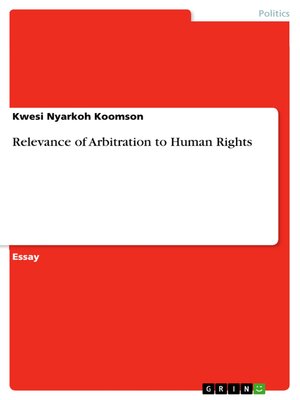
Sign up to save your library
With an OverDrive account, you can save your favorite libraries for at-a-glance information about availability. Find out more about OverDrive accounts.
Find this title in Libby, the library reading app by OverDrive.



Search for a digital library with this title
Title found at these libraries:
| Library Name | Distance |
|---|---|
| Loading... |
Essay from the year 2016 in the subject Politics - International Politics - Topic: Public International Law and Human Rights, , course: Human Rights, language: English, abstract: Conflicts and disputes are normal and natural in everyday life. Conflict is not an event; it is a process. Human beings face conflicts always and everywhere, at all levels (Galtung 1996). How conflicts are managed is what makes the difference. A common way disputes the world over are resolved is through litigation. Litigation however is often characterized by delays and other debilitating activities which adversely affect the conflict resolution process and accentuates the popular legal maxim 'justice delayed is justice denied'. Litigation is also thought to be relatively expensive and too elitist. These undoubted flaws that surround litigation led to other means of conflicts resolution collectively termed Alternative Dispute Resolution or (ADR). The Legal Information Institute (LII, 2014) defines Alternative Dispute Resolution as any method of resolving disputes other than by litigation. Courts of competence jurisdiction could be directed to review the validity of Alternative Dispute Resolution methods, but they will hardly overturn decisions and awards proposed by ADR if the disputing parties formed a valid contract to abide by them. ADR methods or types include mediation, negotiation, conciliation, collaborative law and arbitration. ADR is arguably a much better option as all stakeholders in a conflict can resolve their own differences by working together to come up with an agreement that satisfies all parties involved. This write-up will however focus on one of the popular modes of ADR, called Arbitration. The write-up will look at a brief history of arbitration, the meaning of the term arbitration, its features and characteristics, types and forms, merits and demerits and most importantly how arbitration skills could be utilized to address human rights-related disputes, conflicts and matters.







